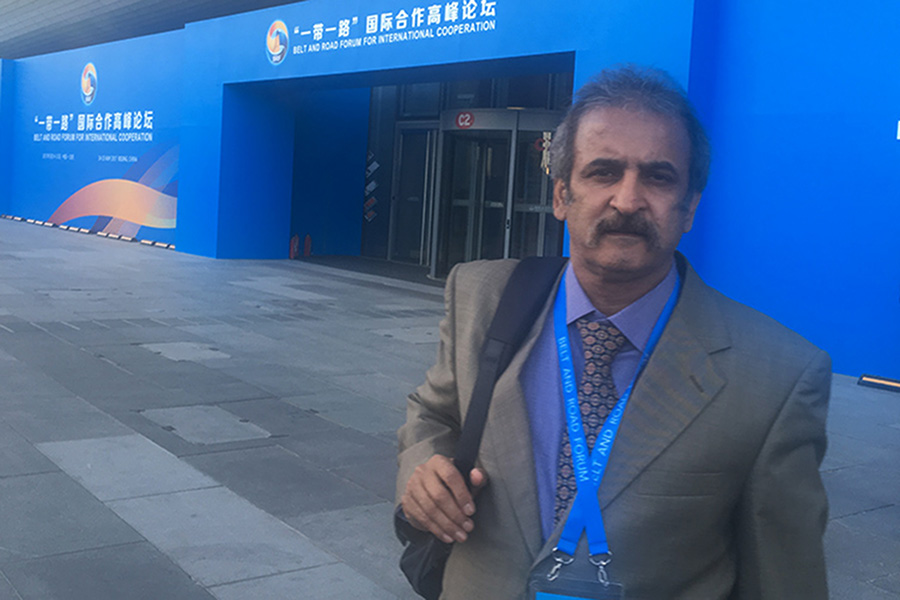Ahmad Rashid Malik: CPEC Is Transforming Pakistan’s Economy

The China-Pakistan Economic Corridor (CPEC), seen by many as a flagship project of the Belt and Road Initiative, has made inspiring progress in generating economic vitality and regional connectivity. With the Belt and Road Forum for International Cooperation (BRF) having closed with fruitful results on May 15 in Beijing, China Pictorial talked to Ahmad Rashid Malik, director of the China-Pakistan Study Centre (CPSC) at the Institute of Strategic Studies Islamabad, in Pakistan, for a review of the forum and a close examination of how the CPEC is changing the South Asian country.
China Pictorial: What part of President Xi Jinping’s speech at the opening ceremony of the BRF impressed you most?
Dr. Malik: I listened to his speech carefully, with emotion and a thriving heart. I was impressed by his visionary leadership, not only for China but also for the world. President Xi proved that he is a world leader. He called for every country to participate in the Belt and Road Initiative, a project for this century. He remarked that ‘history is our teacher,’ and talked about the ancient Silk Road, which connected China with the rest of the world and opened up relations, as well as exchanges of ideas, goods and knowledge. The Silk Road, as he said, was a civilizational corridor that brought many civilizations together. The Belt and Road Initiative promotes development and cooperation among nations across all continents. This is President Xi’s vision of connectivity, where all are included.
China Pictorial: How do you evaluate the benefits that the CEPC has brought to Pakistani people?
Dr. Malik: It is difficult to estimate because they are enormous and everywhere. The CPEC is now transforming Pakistan’s economy to a large extent. We are connecting various parts of Pakistan with new roads, bridges, tunnels and industrial zones under construction. Around 60,000 jobs have been created in the past two years. With technical and scientific education expanding and new universities being planned, the CPEC is also revolutionizing Pakistan’s educational system in line with modern demands. By March 2018, Pakistan is going to have 8,000 MW of additional electricity in CPEC priority areas of energy infrastructure development. All this is being done because of the CPEC. We are happy that China is collaborating with us on a massive scale to convert our economy under the Belt and Road Initiative.
China Pictorial: Some critics were skeptical of China’s intentions when the Belt and Road Initiative was proposed, and slammed it for ‘hidden geopolitical purposes’. What do you think?
Dr. Malik: China has no hidden agenda. It is useless to criticize such motives that are not there at all. The Belt and Road Initiative is an economic initiative, and all countries share a common vision for cooperation and development. The agenda of the Belt and Road Initiative is open, and China has attached no political conditions to the Belt and Road projects for any country or international organization. The Belt and Road Initiative is open to all. It is not an elite club. It involves developing, emerging, and developed countries. The Belt and Road Forum in Beijing, where 29 foreign state leaders and an enormous number of experts gathered, is testament to this fact. President Xi said that the Belt and Road Initiative does not put the sovereignty of any nation at risk. It is a cooperative platform, and it jointly addresses challenges.
China Pictorial: Some regions of Pakistan are still disturbed by political instability and unrest. Do you think the construction of the Belt and Road will help improve the security situation, and how?
Dr. Malik: Sure, the CPEC addresses the issue of terrorism in Pakistan too. In the two years since the CPEC was introduced in Pakistan, the political and security situations have improved greatly. Some countries that are not Belt and Road participants are involved in terrorist activities within Pakistan, but the Pakistani government has brought over 95 percent of terrorism under control. Today, we are much safer and more secure. We enjoy political stability. The government is vigilant, and Pakistan is cooperating with China to eliminate terrorism. Today, many other countries want to learn from Pakistan’s counter-terrorism experience.
China Pictorial: Do you have any advice for Pakistan about further engagement with the Belt and Road Initiative, or contributions to the peaceful development and shared prosperity of the region?
Dr. Malik: The Belt and Road Initiative is a long-term initiative. It will continue to grow in many directions. By the time the first phase of the CPEC is completed in 2030, Pakistan will have become a powerful economy. This will open a new vista for cooperation between Pakistan and China. By that time, Pakistan will be assisting developing countries and sharing our development experience. For every upcoming government in Pakistan, the CPEC should continue, as it has become vital to the national interests of Pakistan. A prosperous Pakistan can contribute to regional prosperity and peace. This is President Xi’s real vision for the Belt and Road.
